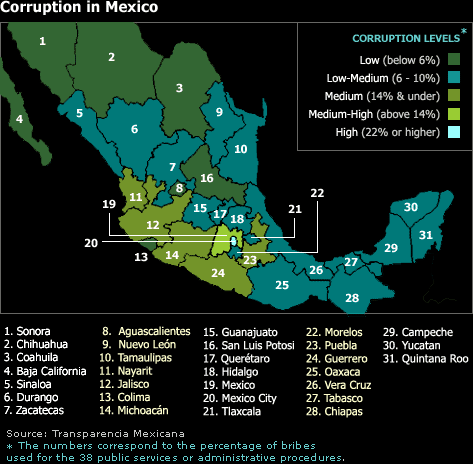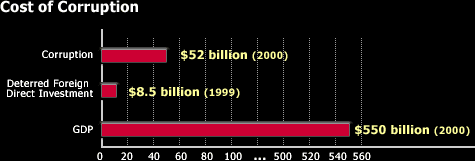|
|
|
Transparencia Mexicana, a
chapter of the corruption watchdog group Transparency International,
conducted a survey of 13,790 households in 2000 in order to measure
corruption nationwide. The survey found that Mexico's capital,
Mexico City, heads the list of areas in the country with the highest
incidence of corruption, followed by Guerrero, Puebla, Jalisco and
Michoacan states. In Mexico City, for every 100 public services,
22.6 percent (of the 38 administrative procedures tracked) in the
survey required bribes. According to Transparencia Mexicana, Mexican households participated in 214 millions acts of corruption. Families paid $2.3 billion in bribes in 2001 to receive public services -- from getting phone service to obtaining exception from military service -- a sum equivalent to about one percent of Mexico's gross domestic product. The average bribe in Mexico amounted to an estimated $10. A Mexican family, the organization reports, pays an average of $109.50 in bribes each year -- not an insignificant number in a country where the average annual income is $9,100.
According to anti-corruption czar Francisco
Barrio, the cost of corruption by government officials and by
everyday Mexicans surpassed the amount budgeted for education by
more than three percentage points -- some 9.5 percent of Mexico's
GDP of $550 billion. Recent studies by the World Economic Forum, an
international organization that works to improve worldwide economic
conditions, found that the business environment such as rule of law,
transparency and corruption were disincentives for foreign
investment in Mexico. Corruption, which is often described as a tax,
adds to the cost of doing business. The Opacity Index, a study
conducted by Pricewaterhouse Coopers, found that Mexico lost $8.5
billion in foreign direct investments in 1999 due to corruption and
other suspect legal or economic practices. |

